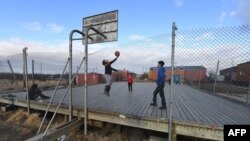A new study says thawing permafrost, or soil that is usually frozen year-round, in the world's arctic regions is releasing greenhouse gases not accounted for in global estimates, making it more difficult to fight climate change.
The study, published Monday in the science journal Proceedings of the National Academy of Sciences, reports that the Siberia region of Russia last year saw a record-setting temperature of 38 degrees Celsius, the highest temperature ever recorded inside the Arctic Circle, where most of the world's permafrost exists.
The researchers behind the study say this permafrost region contains a massive frozen store of ancient organic carbon dioxide, accumulated over tens of thousands of years, totaling approximately twice the amount of carbon dioxide that is in Earth's atmosphere. Freezing temperatures have prevented the carbon dioxide — as well as methane, another greenhouse gas — from escaping, until now.
Meanwhile, unprecedented wildfires in the region last year also prompted a record amount of the gases to be released into the atmosphere.
Researchers say the big problem is that the world's top climate policymakers, including the United Nations' Intergovernmental Panel on Climate Change, aren't focusing enough on the emissions released from the melting permafrost and Arctic wildfires.
In 2016, when global leaders signed the Paris climate agreement, they established emissions budgets with the goal of keeping average global temperatures from rising more than 1.5 degrees Celsius beyond preindustrial levels. But researchers say the data behind those emissions budgets did not account for gases from thawing permafrost.
In an interview, climatologist and co-author of the study Brendan Rodgers said the new figures need to be included if climate change is going to be addressed successfully.
"We're effectively in a race against time to reduce emissions and avoid the most severe impacts of climate change," he said. "Without including permafrost emissions and northern wildfires, we're using the wrong mile markers in that race."





